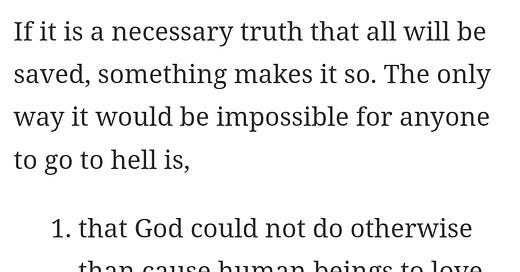Contra the caricature, below, as set forth in The Incoherencies of Hard Universalism by James Dominic Rooney —
God, free of necessity, WOULD not do otherwise than create human beings with an essential erotic love of God & potential agapic love of God.
It’s impossible for anyone to remain in purgatory because imperfect contrition & impeccability would efficaciously & infallibly follow the non-necessitating purgative graces of an immediate divine presence.
God, free of necessity, would not do otherwise than gift all such a beatific vision because, for some, that could allow the essential teloi of their primary nature to be obscured & the tropic teloi of their secondary nature to be frustrated.
Note: In the majoritarian logical defenses & evidential theodicies of hell, typically, a greater good argument is invoked in conjunction with a mysterian appeal of a skeptical theism. That appeal would seem to block what amounts to universalism’s noseeum inference vis a vis the skeptical theist’s putative greater goods (we can’t see ‘um, they ain’t there).
Universalists are not employing some run of the mill noseeum inference, though. Positively stated, they are invoking a weseeum inference (we see Jesus, He wouldn’t do that).
The universalist weseeum inference doesn’t suggest that God’s utterly comprehensible by finite & fallible rational creatures. Rather, it urges that Jesus’ revelation of his Daddy’s ways has made the divine will supremely intelligible, morally.
So, we can largely trust our shared parental instincts, moral intuitions, aesthetic sensibilities and common sense and rest confidently assured that they won’t be turned on their heads eschatologically, i.e. they’ll be exceedingly surpassed without being in any measure overturned.





Or, consider these 9 truthmakers:
1 God is the summum bonum (greatest good and highest well-being).
2 God is the ground of all possibilities.
3 God wills the final good (highest well-being) of all creatures in him.
4 God permits only possibilities that aid rational creatures in achieving their highest well-being in him. (From P1-3)
5 The possibility of finally failing to achieve one’s highest well-being in God is not necessary to achieving that well-being.
6 God 'would not' permit the possibility of any rational creature finally failing to achieve its highest well-being in him. (From P1-5)
7 God 'has not' permitted the possibility of any rational creature finally failing to achieve its highest well-being in him. (From P6)
8 No evil God permits can prevent a rational creature’s achieving its highest good in him. (From P3, P7)
9 ‘God as summum bonum’ is not compossible with ‘the possible irrevocable loss of a rational creature’s highest well-being in God’. (From P1-4)
Conclusion 1: Therefore, it is not possible that any rational creature should fail irrevocably to achieve its highest well-being in God.
Conclusion 2: Therefore, both annihilationism and infernalism are impossible since both assert the possibility of a rational creature’s failing to achieve its highest well-being in God.
https://afkimel.wordpress.com/2023/02/22/the-god-of-the-possible/
Pardon the link! That's barging in. Sorry.
Rooney thinks like a mechanic: this collides with that and ‘causes’ such and such an effect. Such ‘chains’ of cause and effect seem to be how he tries to explain everything. Very machine-like.
One could revise his primary proposition and the triad. But first, no universalist thinks it’s metaphysically necessary that all be saved since creation itself is a metaphysical (or ontological) contingency. So it’s important to clarify the necessity of the final salvation of all. We’re talking about what follows necessarily from God being infinite love and freely creating, not a ‘necessary truth’ per se. And we should note that no universalist need deny that ‘anyone goes to hell’. That's not the issue. But over all, it seems to me that since Rooney only sees mechanical bits and pieces colliding and producing physical results, he’s unable to contemplate the question under other terms.
I'm agree all truths have one or more truthmaker. So perhaps:
If it is true that all shall eventually be saved, something makes it true. The truthmakers are:
1) Human beings cannot foreclose upon themselves the possibility of achieving their highest well-being in God,
2) Human beings cannot succeed in simply rejecting God freely over and over 'forever',
3) God could not fail to pursue the highest well-being of human beings in him, and
4) Part of (3) means that God will restore clarity of mind and remove the habituated tendencies of body and mind.
This means the achieving of our highest well-being in God is the *only* possible final, irrevocable closure to the capacities and appetites of human nature. That really should be enough.